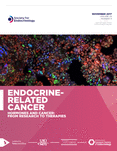FOXO factors and breast cancer: outfoxing endocrine resistance
- Hormones and Cancer Group, Cancer Genetics Laboratory, Kolling Institute of Medical Research, Royal North Shore Hospital, Pacific Highway Saint Leonards, Sydney, New South Wales 2065, Australia
- Correspondence should be addressed to M Bullock; Email: martyn.bullock{at}sydney.edu.au
Abstract
The majority of metastatic breast cancers cannot be cured and present a major public health problem worldwide. Approximately 70% of breast cancers express the estrogen receptor, and endocrine-based therapies have significantly improved patient outcomes. However, the development of endocrine resistance is extremely common. Understanding the molecular pathways that regulate the hormone sensitivity of breast cancer cells is important to improving the efficacy of endocrine therapy. It is becoming clearer that the PI3K–AKT–forkhead box O (FOXO) signaling axis is a key player in the hormone-independent growth of many breast cancers. Constitutive PI3K–AKT pathway activation, a driver of breast cancer growth, causes down-regulation of FOXO tumor suppressor functions. This review will summarize what is currently known about the role of FOXOs in endocrine-resistance mechanisms. It will also suggest potential therapeutic strategies for the restoration of normal FOXO transcriptional activity.
- Revision received 17 November 2015
- Accepted 26 November 2015
- Made available online as an Accepted Preprint 26 November 2015
- © 2016 Society for Endocrinology












